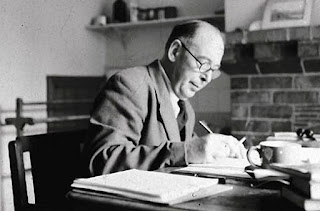Discussion Questions for The Pilgrim's Regress Thursday July 12th 7:20 p.m. B&N
1. What do you think is the significance of the fact that John must regress rather than progress like Bunyan’s Christian?
2. Lewis says that this book is an “allegorical apology for Christianity, Reason and Romanticism”. How is this book a defense of each of these three entities?
3. What is the significance of the fact that John is born in the land of Puritania? How might this relate to Lewis’ own life? How do Puritanism in Bunyan’s allegory and Puritanism in Lewis’ allegory compare and contrast?
4. How does John’s experience of the primroses compare to Lewis’ first experience of “joy”?
5. What is the meaning of the masks in Book I, chapter 3? Has your experience of religion ever been similar to John’s? How?
6. What is the meaning of the Island? Is John’s vision of the Island merely an aesthetic experience? Does reading John’s story fill you with any desire to see the Island?
7. What is meant by the chapters entitled “Leah for Rachel”? Have you ever sought joy in a certain place only to find it wasn’t there?
8. How does John’s desire for the Island ultimately lead him to Mother Kirk? How did Lewis’ experience of joy lead him to Christ? How about you– has desire played any role in leading you to God?
9. What role does Reason play in leading John to Mother Kirk? What role did Reason play in leading Lewis to Christianity? What role has Reason played in leading you closer to Christ?
10. What did you think of Mother Kirk’s Story in Book V, Chapter 2? Do you find it more or less compelling than the corresponding biblical account of the fall? Why?
11. What is the significance of the Man’s comment to John that he and Vertue will both recover only if they keep together?
12. There is an element of fear in John that runs throughout the story, fear of the Landlord, fear of the black hole, fear of death, fear of Mother Kirk, fear of prayer. Why is John afraid and how is this fear ultimately transformed?
13. In the chapter entitled “Caught” John expresses one of his deepest wishes. What is that wish? How does this correspond to Lewis’ own wishes before his conversion? Have you ever had this wish?
14. The essence of The Pilgrim’s Regress is perhaps best summed up in John’s words to the hermit that he set out to find an Island and he found a Landlord instead. How are the Island and the Landlord related? How did you feel when John finally crossed the Canyon and saw the Island and realized it was the other side of the Eastern Mountains?
15. The hermit tells John that there are two ways to the Landlord that were united in the Landlord’s Son. What are these two ways? Who travels these two different routes? What do you think of Lewis’ theology on this point?
16. In the second chapter entitled “Archtype and Ectype” John says he is afraid the things the Landlord wants for him may be completely unlike his own desires. Have you ever had this fear? How does the hermit answer John’s fear?
17. What is the significance of the fact that John must dive into the pool to get across the Canyon? What does the dive into the pool symbolize?
18. Why does the world look different to John as he regresses? What is Lewis’ meaning here?
19. John’s angelic guide during his regress makes the statement that if anyone really wants to damage the Landlord’s character, rather than say the Landlord is cruel he should say that the Landlord is an inveterate gambler. What do you think the angel means by this statement? How does this fit in to Lewis’ theology? What do you think?
(From "Speaking of Jack" by-Will Vaus)

